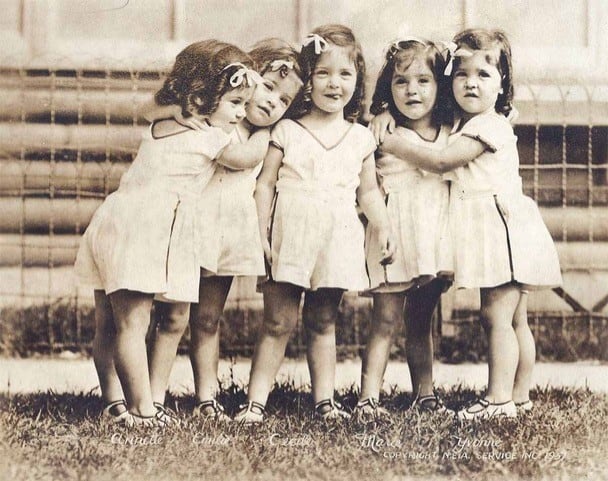
The Dionne Quintuplets
By Mary Hoar, City of Yonkers Historian, President Emerita Yonkers Historical Society, recipient of the 2004 Key to History, Member of the Yonkers Landmarks Preservation Board, and President Untermyer Performing Arts Council
Monday, May 22nd
May 22, 1946: The Hebrew National Orphan Home on Tuckahoe Road waited to pick up 20 young Jewish refugees; the children arrived two days earlier and were still in screening at Ellis Island. According to Executive Director Reuben Koftoff, European Jewish Children’s Aid wanted the Yonkers’ facility to serve as a reception center for children coming to the US; they then would send the children to various parts of the US for rehabilitation.
May 22, 1950: Twenty-six-year-old Yonkers resident Don Hornsby, a pianist-acrobat who recently had signed a five-year-contract with NBC TV, passed away at Grasslands Hospital six days after being stricken with polio. Hornsby had lived in the Grayvine Hudson Apartments on Ravine Avenue for just a few weeks.
A discovery of Bob Hope and Fred Allen, Hornsby was to be the host of NBC’s first late night network television program. Yonkers resident Morey Amsterdam, replaced him.
Tuesday, May 23rd
May 23, 1916: The Yonkers Health Department ruled the Nepperhan River between Lake and Roberts Avenues was unsanitary; they held the owners of property in the area responsible for polluting the stream with debris.
May 23, 1944: J. M. Johnson, Director of the Federal Office of Defense Transportation, announced the New York State Racing Commission formally assigned all Empire City Races to the Jamaica track. The move purely was an emergency wartime measure, and “neither the Commission nor the State of New York were taking racing permanently from Westchester.”
Wednesday, May 24th
May 24, 1926: John Burke, newly elected President of the Yonkers Board of Education, announced “There will be no more lengthy executive sessions, if I can help it!”
May 24, 1926: Because of a sudden surge in dog bites, Yonkers hired temporary dogcatchers to round up stray dogs, hoping the large number of bites would drop. They began rigid enforcement of requiring dogs to be muzzled or leashed on the streets of Yonkers.
May 24, 1956: Yonkers Police cars converged on the City Jail, after an alarm was sent to Police Headquarters! Not knowing what to expect, whether a jail break or a riot, they did a thorough search of the jail. What dangerous situation did they find? A short in the alarm system!
Thursday, May 25th
May 25, 1931: The Directors of the Hollywood Inn, the stellar Yonkers institution since it opened in 1896, carefully studied their finances. They had amassed debt of $43,000 and were operating at an annual loss of $18,000. The Board unanimously affirmed their previous decision to break up the organization and return the property to the Cochran heirs. Although members wanted to keep it open, they were unable to put together a plan or financial package to keep it open. It closed forever at 11 pm, May 30th.
May 25, 1948: Park Superintendent John Regan announced Parks Staff raised 22,000 annuals in city greenhouses for the city’s parks, which the workers were busy planting around Yonkers.
Special attention was given to Washington Park, where City Hall was. One thousand-five hundred plants were placed in the two beds flanking the Nepperhan Avenue entrance, featuring red Cannas and Coleus, with borders of Marigolds. Beds along the front steps of City Hall featured Begonias; farther down were beds with Salvia, Cannas, Ageratum and Salvia. Beds in front of the War Memorial featured red geraniums bordered by Alyssum. Both Yonkers greenhouses were at Trevor Park and on the Untermyer Estate.
Friday, May 26th
May 26, 1907: The Board of Police Commissioners reported that since the inauguration motorcycle patrol was started twelve months earlier, Officers Van Steenbergh and King had arrested 158 speeding violators. All but three were found guilty of exceeding the twelve-mile an hour speed limit in Yonkers.
May 26, 1929: A large stock of candy was delivered to the Yonkers City Jail, not for the prisoners, but for children! Suggested by Lieutenant John Scheiber, it was hoped sweets would help calm lost children picked up by policemen on the street and kept at the lockup until parents came for them.
Saturday, May 27th
May 27, 1940: According to Recruiting Officer Sergeant Elmer Holt, more than 250 men had tried to enlist the previous week; most of the men were unemployed and wanted a job. Unfortunately, many of the men were rejected because of physical issues.
May 27, 1941: At a gathering in St. Casimir’s Church Hall to celebrated Polish Constitution Day, Reverend Joseph Szarek, Polish refugee priest, spoke about cruel and inhuman treatment of the Polish people by the invading Nazi troops.
Sunday, May 28th
May 28, 1937: Children at Leake & Watts Orphan House celebrated the third birthday of the Dionne Quintuplets, Yvonne, Annette, Cecile, Emilie, and Marie, with the help of the “Princess of Song,” Jessica Dragonette. Dragonette was a popular radio singer, who was extremely active in the World War II effort. Not only did she frequently perform for the troops and sell a record number of war bonds, she performed so often for charities benefiting the troops, she was made an honorary Colonel. In 1932 and 1943, she was voted the best female singer of the country.
May 28, 1965: Dr. Martin Luther King addressed the Negro American Labor Council at their fifth annual convention held at the Westchester Town House on Tuckahoe Road. The convention, whose theme was “Economic Freedom and Security for the Black and White Poor,” was attended by labor leaders from all over the country.
Questions or comments? Email YonkersHistory1646@gmail.com.
For information on the Yonkers Historical Society, Sherwood House and upcoming events, please visit our website www.yonkershistoricalsociety.org, call 914-961-8940 or email info@yonkershistoricalsociety.org.





